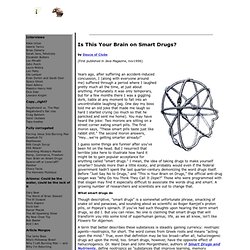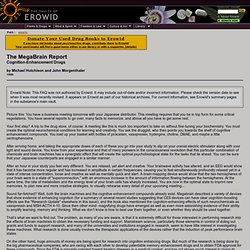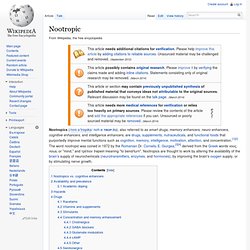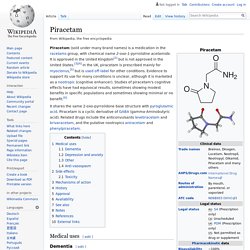

Is This Your Brain on Smart Drugs? By Deuce of Clubs (First published in Java Magazine, nov1996) Years ago, after suffering an accident-induced concussion, I (along with everyone around me) suffered through a period where I laughed pretty much all the time, at just about anything.

Fortunately it was only temporary, but for a few months there I was a giggling dork, liable at any moment to fall into an uncontrollable laughing jag. One day my boss told me an old joke that made me laugh so hard I started crying (so much so that he panicked and sent me home). You may have heard the joke: Two morons are sitting on a street corner eating smart pills. I guess some things are funnier after you've been hit on the head. What smart drugs do Though descriptive, "smart drugs" is a somewhat unfortunate phrase, smacking of snake oil and panaceas, and sounding about as scientific as Roger Ramjet's proton pills, or Popeye's spinach. How smart drugs work Bold claims—is there anything to them?
Many nootropics occur naturally. Further research. Nootropic Vaults : The MegaBrain Report. Erowid Note: This FAQ was not authored by Erowid.

It may include out-of-date and/or incorrect information. Please check the version date to see when it was most recently revised. It appears on Erowid as part of our historical archives. For current information, see Erowid's summary pages in the substance's main vault. Picture this: You have a business meeting tomorrow with your Japanese distributor. Your first step? After arriving home, and taking the appropriate doses of each of these you go into your study to slip on your cranial electric stimulator along with your light and sound device. After an hour in your study you feel very different. Sound far-fetched? That's what we want to find out. On the other hand, huge amounts of money are being spent for research into cognition enhancing drugs. And so, MEGABRAIN REPORT has concluded that if we really want more research into mind-machine mind-food interactions we'd better start doing it ourselves.
Piracetam is not sold in the US. Piracetam. Cognitive Nutrition Piracetam 800 mg 120 capsules - Cognitive Nutrition. Piracetam 800 mg 120 capsules -Description- Piracetam (also called 2-oxo-Pyrrolidine Acetamide, Nootropil) is a derivative of the neurotransmitter GABA (Gamma Amino Butyric Acid).

Chemically related to the amino acid Pyroglutamic Acid (Pyrrolidine Carboxylic acid), which occurs in cerebrospinal fluid and plays an important role in cognitive functioning. Piracetam 800 mg 120 capsules. Nootropic. Nootropics (/noʊ.əˈtrɒpɨks/ noh-ə-TROP-iks), also referred to as smart drugs, memory enhancers, neuro enhancers, cognitive enhancers, and intelligence enhancers, are drugs, supplements, nutraceuticals, and functional foods that purportedly improve mental functions such as cognition, memory, intelligence, motivation, attention, and concentration.[1][2] The word nootropic was coined in 1972 by the Romanian Dr.

Corneliu E. Giurgea,[3][4] derived from the Greek words νους nous, or "mind," and τρέπειν trepein meaning "to bend/turn". Nootropics are thought to work by altering the availability of the brain's supply of neurochemicals (neurotransmitters, enzymes, and hormones), by improving the brain's oxygen supply, or by stimulating nerve growth. Nootropics vs. cognitive enhancers[edit] Giurgea's nootropic criteria: Since Giurgea's original criteria were first published, there has been little agreement as to what truly constitutes a nootropic compound.
Skondia's nootropic criteria: I. A. B. II. Piracetam. Piracetam (sold under many brand names) is a medication in the racetams group, with chemical name 2-oxo-1-pyrrolidine acetamide.

It is approved in the United Kingdom[2] but is not approved in the United States.[3][4] In the UK, piracetam is prescribed mainly for myoclonus,[5] but is used off-label for other conditions. Evidence to support its use for many conditions is unclear, although it is marketed as a nootropic (cognitive enhancer). Studies of piracetam's cognitive effects have had equivocal results, sometimes showing modest benefits in specific populations and sometimes showing minimal or no benefit.[6] It shares the same 2-oxo-pyrrolidone base structure with pyroglutamic acid. Piracetam is a cyclic derivative of GABA (gamma-Aminobutyric acid). Medical uses[edit] Dementia[edit] Depression and anxiety[edit]